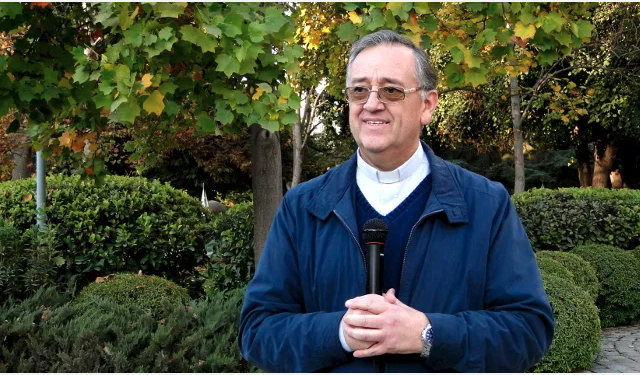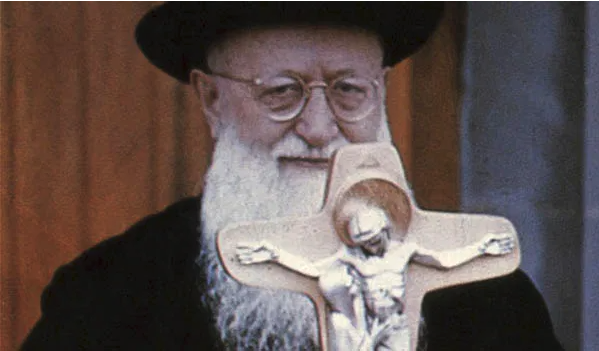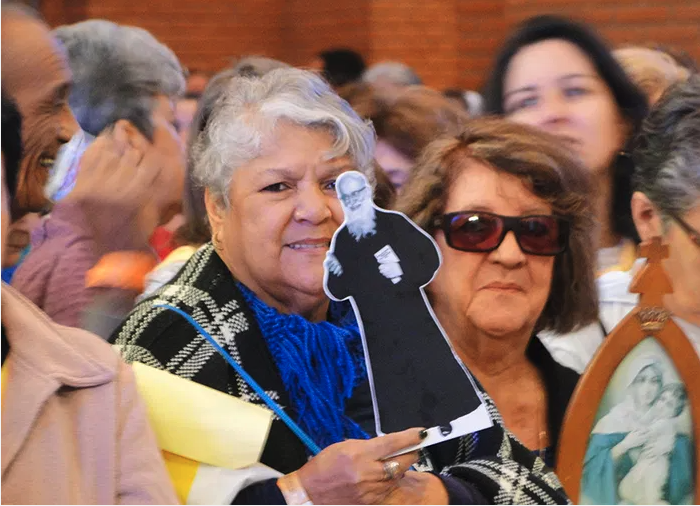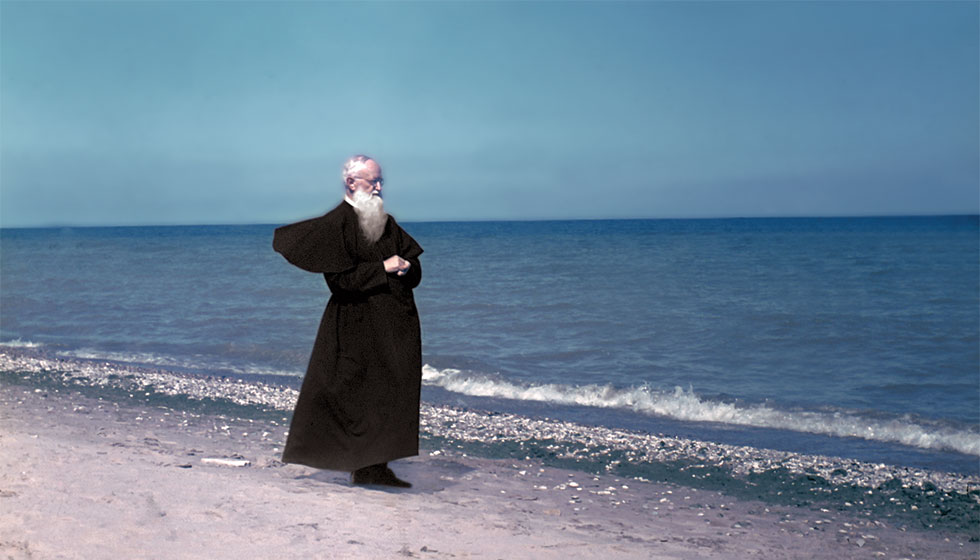Interview with Fr. Eduardo Aguirre, postulator of the canonization cause of Fr. Kentenich, from Rome.
Original: Schoenstatt Brasil – schoenstatt.org.br
By Sister M. Márcia Silva, from Brazil
On February 10, 1975, the cause of canonization of the founder of Schoenstatt was opened in the Diocese of Trier.
Sr. M. Márcia Silva – This month we remember the 46th anniversary of the opening of the canonization process of Fr. Joseph Kentenich. This is certainly a time of much research and study. The postulator of the cause, Fr. Eduardo Aguirre, tells us about his work and the participation of the Schoenstatt Family in this stage of the process.
- What is it like to be at the head of this process, as postulator, precisely at this time when publications and accusations about Fr. Kentenich’s conduct have appeared?
Acceleration in the canonization process
Since the beginning of July 2020, when the accusations and calumnies of Mrs. von Teuffenbach became known, we can say that the process of canonization of our father and founder has undergone a surprising acceleration. In fact, these accusations have motivated a renewed interest for the person of Fr. Kentenich in wide circles of our Family: the currents of prayer for the process of Fr. Kentenich have intensified, his person has become more present in the conscience of our Schoenstatt Family and a great interest has been awakened in studying and better knowing the history of the visitation and the time of the exile.
In this sense, much research has been done – and continues to be done – on the existing documents in different archives and many articles and studies are being published as a result of this research. An intense work is being carried out that will be very positive and give a strong impulse to Fr. Kentenich’s canonization process.
The work carried out by the new commission for historical research regarding this time in Schoenstatt’s history will also be very important. The commission was established by the bishop of Trier, who was last responsible for the development of Fr. Kentenich’s cause in its diocesan stage. We can trust that this commission will be able to definitively clarify the questions, doubts, and motives that led to Fr. Kentenich’s exile.
We hope that the cause will soon reach Rome
We also hope that with this, the diocesan phase of the process can be closed and that it can reach Rome, where it should be definitively resolved. Of course, along with these positive consequences of all the controversies that have arisen, there has also been pain, confusion, doubts and discussions about the figure of Fr. Kentenich in the Schoenstatt Family. In this sense, these last months have not been easy.
For me it has been a demanding and challenging time, which has intensified my work. I have had to study and review a large number of documents. Under normal conditions and times, all this work would be taken up with much more time and calm.
Unfortunate and unsubstantiated allegations
I can also say that Mrs. von Teuffenbach’s accusations have disturbed and also outraged me because of how unfortunate and unserious they are; how she has manipulated and cherry-picked some sources, taking them out of context, and ignoring others, to construct her accusations of sexual abuse and tyrannical behavior on the part of Fr. Kentenich. She has clearly stated that she would like to prevent his cause from going forward.
I have never doubted the moral integrity of Fr. Kentenich
But I can say that at no time have I ever doubted the moral integrity of Fr. Kentenich, nor the sanctity he attained precisely because of the trials to which he was subjected by the Holy Office. What I have studied during this intense time has strengthened my admiration for Fr. Kentenich and my conviction that he is a holy and prophetic figure for our time and the future of the Church.
Therefore, I can finally say that I am grateful and optimistic about the evolution of Fr. Kentenich’s canonization process.

- How is the work going with the documents you have had access to in the Vatican archives?
So far, I have been able to study about 400 documents, covering more than 2,000 pages. This is about half of the documents that refer to Fr. Kentenich in the archives of the Congregation for the Doctrine of the Faith (former Holy Office). Therefore, I still have a similar number of documents to research. Because of COVID-19, access to the archives has been limited and I cannot go to them continuously. But I hope to soon receive a copy of all the archives related to Fr. Kentenich and Schoenstatt, which I was able to order a few weeks ago, so I can study them more calmly at home.
There are no important or surprising elements
As for the contents, the reasons for the visit and the confrontations with the Holy Office, I found little new. Many documents from this archive were already known during the process of Fr. Kentenich’s beatification and are present in the archives of the cause. They are decrees, letters, reports, declarations, etc. which had already been studied and considered by the Historical Commission that, at the time, was formed by the bishop of Trier within the framework of the diocesan process, and which had already issued its final report. All this documentation concerning the process is under secrecy, i.e. it cannot be disclosed.
Naturally, I also found documents that were not known and are not in the archives of the process. Among them, I believe the most important, and which have not yet been considered in the cause, are the reports on the apostolic visitation (1951-1953) written by the visitator, Fr. Sebastian Tromp. They are four reports that were presented internally to the Holy Office and comprise about 200 pages written in Latin. These reports have been kept secret since then until now. Once translated, we will be able to study them in detail. But as far as the content is concerned, in general they do not provide important unknown or surprising elements.
In the archives of the Holy Office there is no accusation of any immoral conduct of Fr. Kentenich
In any case, I can affirm that I have not found any accusation of sexual abuse, acts of violence or immoral conduct on the part of Fr. Kentenich in the archives of the Holy Office. Neither before nor since has there been any such accusation against him. If there had been any, we can be sure that the Holy Office, the supreme tribunal of the Church at that time, would not have covered it up, nor would it have turned a “blind eye” to such conduct. If it had, the Holy Office would have to be accused of cover-up. But the Holy Office did not make any judgment on any such accusation against Father Kentenich. Even his staunchest detractors did not accuse him of sexual abuse.
Kentenich himself, to the extent that he was aware of some defamations and rumors in this regard, categorically denied them. (Cf. “Apologia pro vita mea”, 1960).
In the archives I also found a good number of writings that reached the Holy Office and even the Holy Father, Pius XII, in defense of the suitability of Fr. Kentenich, his teachings and practices, as well as clarifications about the spirituality and pedagogy of Schoenstatt, and the meaning of the person of the founder for the Schoenstatt Family. There are no copies of several of them in the documentation of the cause.

- As postulator, what is your main task at the moment?
As you can see, I have concentrated on the study and classification of a large number of documents that have to do with this period of Fr. Kentenich’s history. I have also been in permanent contact with a group of Sisters of Mary who are working intensively on the study of their own archives and the documents we share from other archives. The same goes for the initiatives taken by the General Presidium, which has formed study and communication commissions, and coordinates with the work of other Schoenstatt Fathers who are researching, as well as other members of our Family.
Some fruits of this research and work can be seen on the official Schoenstatt website: www.schoenstatt.com.
- After the publications, has there been any change in the involvement and interest of the Schoenstatt Family in the cause for the Founder’s beatification?
Increased interest in the person of Fr. Kentenich
As I have already mentioned, this whole situation has put the person of Fr. Kentenich much more in the center of the Schoenstatt Family’s consciousness. It has also intensified the stream of prayer for his sake. I think it can be said that for the present generations of the Schoenstatt Family, this situation motivates, and even demands, a deeper study of this stage of Schoenstatt’s history in order to know and understand more deeply the person, life, and charism of the founder.
Taking into account the most difficult and demanding times in the history of our Schoenstatt Family, because of the persecutions of Father Kentenich by the Nazis and then by the Holy Office, now in various circles of the Family, prayers and offerings are offered to the capital of grace for the “third return, or liberation of Father” or for the “third miracle of the Holy Night”.
Fr. Kentenich was not born a saint
Likewise, all this controversy helps us to have a more realistic view of Fr. Kentenich, and although the accusations of immoral conduct are false, we know that like all human beings he had limits, that he was not infallible, and that he made mistakes. We can say that he did not always get the results he expected and that he may have made mistakes in judging and understanding some of the people who collaborated with him in the founding of Schoenstatt. As is evident, Fr. Kentenich was not born a saint. If he became a saint, it was in the course of a rather eventful life history in which he always struggled to allow himself to be led by Divine Providence, placing himself in Mary’s hands and seriously aspiring to the ideal of sanctity. Whether he achieved this ideal or not is up to the Church to formally declare, after a thorough investigation of his life and work within the framework of the process that will be carried out.

- How do the prayers and groups formed for Fr. Kentenich’s beatification help in your task? Is it possible to do more?
I am sure that it is very important to intensify and increase the offerings of prayers and contributions to the capital of grace, to implore the graces we need, so that our Mother and Queen will be victorious and God’s plans for the cause of our father and founder will be carried out. At the same time, these prayer groups, which have multiplied in various countries and have grown in great numbers, are very important for spreading the consciousness of Fr. Kentenich’s holiness and promoting his canonization process.
Motivated by this stream of prayer, virtual workshops have emerged to get to know Fr. Kentenich better and open the door for us to become more involved. Likewise, online courses based on Father’s biography are offered to learn more about his charism and mission.
As faithful disciples of Fr. Kentenich and encouraged by our Covenant of Love, we trust fully in the Providence of God, who leads us wisely, and in the faithfulness of our Mother, who will once again show her queenly power in these controversies around Fr. Kentenich.
Rome, February 7, 2021
Translation: JKentenich.com
The exile and liberation narrated by Fr. Kentenich
